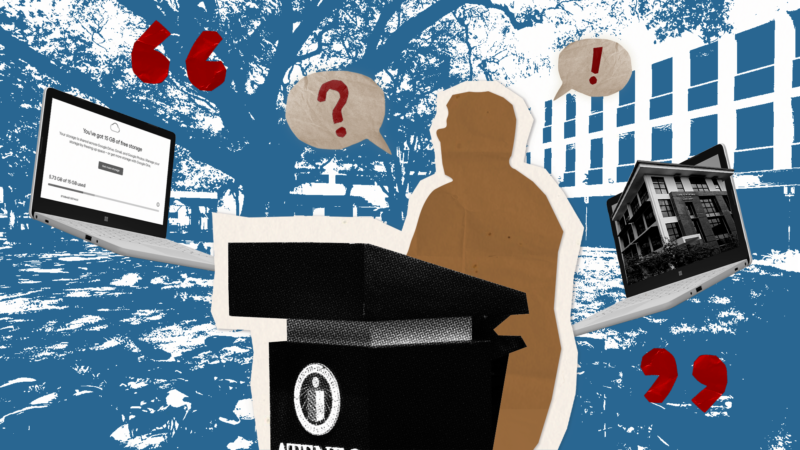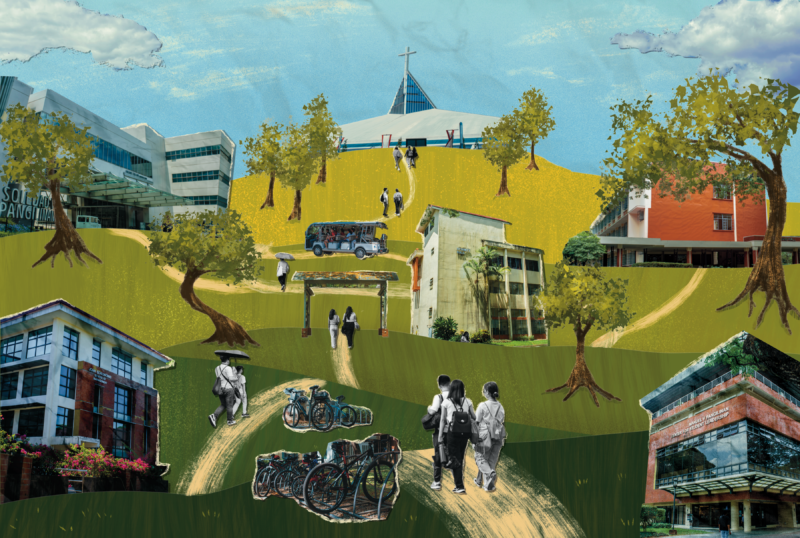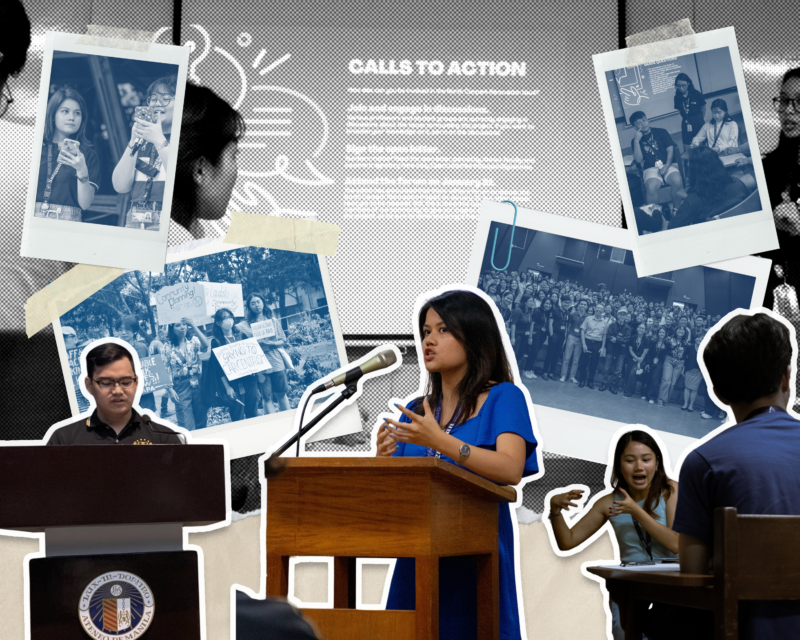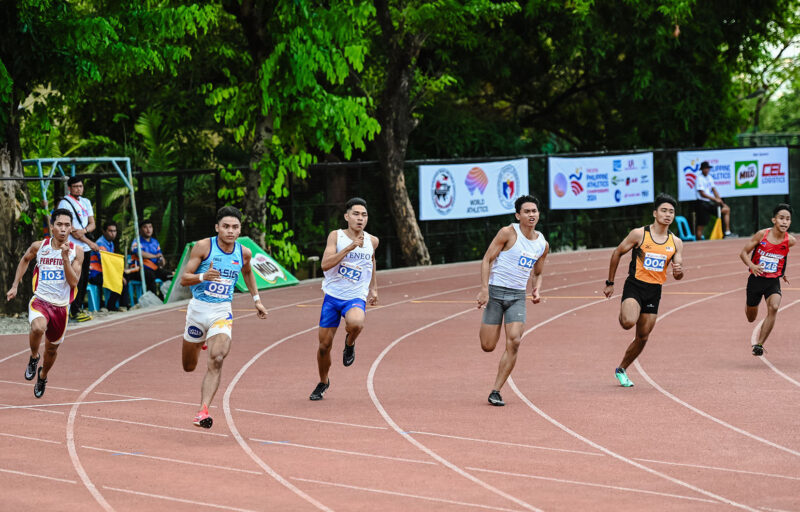STUDENTS’ INTEREST in the University’s guidance services has risen recently, following some negative feedback on the Loyola Schools Office of Guidance and Counseling (LSOGC).
In a Sanggunian Town Hall held last June 16, Sanggunian President Ia Marañon stated that there had been a change of leadership in the LSOGC due to concerns raised about how the office handles mental health cases.
LSOGC Director Gary Faustino, MA, RPsy said that students are “more than welcome” to critique the work of his office. “If there is a problem with the counselors or any of the services, you come to me. I will be able to correct it.”
Moreover, School of Humanities Representative Ferdy Acosta assured students that it is the Sanggunian’s job “not only to relay these criticisms, but to work with both the student body and the [LSOGC] itself to determine how the school’s guidance systems may work.”
Views on services offered
Diplomacy and international relations junior Rissa Nicole Lumba had experienced problems with her four counselors until she decided to stop availing the services altogether.
“It even came to a point where I had to lie about getting better just to get the session over with. I felt like what I was experiencing did not look as severe to them as it did to me, and I didn’t feel any empathy or effort to understand what was really going on. It’s as if they somehow already [had] this assumption as to why I was seeing them, and that [prevented] them from understanding where I was coming from,” she said.
“I remember always feeling worse than when I entered the room after each session. I had counselors who told me I just needed to change the way I look at life and appreciate it more. I had one who looked at me like I was a little child while I told her something serious, and [the counselor] even joked about it—which was something that stuck to me and made me not [want to] go back for another session, ever,” she added.
In response to negative feedback, Faustino cited one of the OGC’s main directives: The pursuit of cura personalis, or care for the whole person. “When we say [cura personalis], we want people to know we take it to heart. If we miss our mark, let us know. We’ll do everything we can to adjust.”
Alluding to an incident that happened on the Red Brick Road last August, a student who requested anonymity and has had experiences with the guidance office, said that “even if the LSOGC continues to reach out to us students, it still won’t be enough to prevent similar episodes from happening. Every person is different, and reacts differently to counseling and psychiatric help.”
Faustino commented on this statement, saying, “Indeed, every student is an individual person and may not react positively to the methods of one counselor. Rather than force the matter, they are assigned to one of the other 13 counselors of the LSOGC.”
While some students found fault in the efficacy of the LSOGC’s services, other students praised the office’s efforts.
“I think the LSOGC really does their job well. They’re underappreciated, but they work hard to reach out to us students and remain updated on how we’re doing. That deserves praise in itself,” said interdisciplinary studies supersenior Alo Lantin.
Meanwhile, English literature junior Bianca Alva sought the LSOGC’s help for career advice. She said, “At first, I expected a lot from their services. I thought they would pull strings or at least refer me to someone who could help.”
“But then I realized these expectations are way out of their job requirements,” continued Alva. “Otherwise, my counselor helps me out by giving me professional advice and helping me set concrete goals.”
Monitoring student well-being
According to Office for Student Services (OSS) Director Cholo Mallillin, the LSOGC maintains a list of known “care person” students.
Care persons were formerly known as “students-at-risk” or StARs, defined as “students who are at an increased risk for self-harm and harm to others due to psycho-emotional concerns,” by the OSS. However, Faustino urged the use of “care persons” as a more “formal” identifier.
Faustino acknowledged the list Mallillin pertained to and said that, when these students do not appear in regular counseling sessions prepared for them, the office “duly follows up.”
However, Faustino noted that this follow-up process is only “up to an extent.” He said that student monitoring is a “community effort” where teachers are also trained to be sensitive to changes in behaviors of students.
On the other hand, Lumba said that counselors did not follow up consistently in her case.
“The counselor who joked about me followed up and continued to text me for a week or two, asking me to go to the [LSOGC], but I didn’t answer na because I was put off. Other than that, wala na,” she said.
The Associate Dean for Academic Affairs also notifies the LSOGC if a student frequently misses classes. If the student is on the care list, the LSOGC reaches out and advises the student to take a leave of absence.
“However, we depend on both the faculty and the students themselves to notify us of these indicators of a breakdown. We’re not out there, we’re in here,” said Faustino.
Meanwhile, the Sanggunian may also step in when students cannot bring themselves to go to the LSOGC themselves.
“The most Sanggu can do to accommodate students who are uncomfortable with going to the LSOGC is to continue working with the office to improve its services,” said Acosta.
New support systems
Among the psychiatric support systems being developed in the University is the Animal Assisted Therapy Program. The LSOGC currently has a therapy dog named Bubu to help calm students during counseling sessions.
Similarly, in the works is the “small group system,” which functions as a pseudo-family in-campus, constantly monitoring and checking up on the well-being of its members.
“[I hope] it will expand, as it will arm students with the know-how to be empathetic listeners to their ‘groupmates.’” said Faustino. He is hopeful that the developing project will create “small, pseudo-family groups in the University.”
Meanwhile, the Sanggunian is preparing to launch its Mental Health Commission. According to Acosta, the initiative was “born out of the want to expand Mental Health Awareness Week and spread awareness on mental health.” The School of Social Sciences Representative’s Chief of Staff Paulina Badion will be the head of this commission.
Additionally, Acosta said that the LSOGC is open to working with student organizations and that student participation is “necessary” if they want to continue seeing reforms in the LSOGC.
With reports from Michelle D. Abad.







